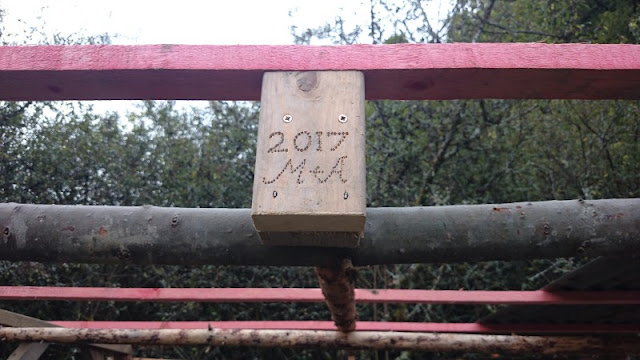 |
| The toll bridge over the Mawddach estuary |
Earlier this month I dipped my toe in the proverbial waters of a Welsh tradition called Plygain (pronounced Plug-aye-n). Every January around these parts, certain churches open their doors for a special evening service of unaccompanied singing.
The songs are old Christian carols, written in Welsh and performed in Welsh (Cymraeg, pronounced Cum-r-aye-g). The whole service is entirely in Cymraeg. The participants tend to be first-language Cymraeg speakers. The only reason I was there is that I attend one of the churches that hosts an annual Plygain service, and as a congregation we decided to put a small choir together and join in.
 |
| An inscription on our woodstore |
By the time we'd got our act together and decided to do it, we only had about ten days left. We quickly scheduled some rehearsals. Hardly any of us speak Cymraeg to any great degree so we relied heavily on Roland the vicar (who can) for how to pronounce the lyrics of the two carols we chose. Fortunately a few of us knew something about singing and could read music so we were able to fit the four parts (soprano, alto, tenor and bass) together by the end of the first rehearsal. I was singing bass with Roland and a local farmer we'd drafted in. We were the weakest link. I realised that I had never actually sung in a choir before - and now I was doing it in Cymraeg before an entirely Cymraeg-speaking audience.
On the night Anna and I rushed to be there on time, she had to leave early from work in Aberystwyth. I was playing the organ too for a couple of congregrational hymns at the start so had to be prompt. Then the Plygain was declared open. There is no compere at a Plygain. Groups or individuals just get up as they feel appropriate, go to the front and launch in. However since we were the host congregation, we got to go first. Lucky us!
It wasn't terrible. Neither do I feel we did ourselves justice. But we got through our song and sat down. No one applauds, or even smiles. This is a serious event. About thirteen acts followed, some of them absolutely beautiful. A half-time congregational hymn, then we all went again in the same order but with our second carols. No song can be repeated, even by a different group. If someone else sings your carol before you get to sing it, you have to sing a back-up one.
The finale was all the men in the church (including me) going to the front and singing a carol out to the women. I had no idea of the tune or what the words meant, but at least I had a lyrics sheet so I could mouth along. Which I had to do because I was in the middle on the front row.
It was a fascinating insight into a part of the local culture which is normally a closed book to the English. By this time next year my Cymraeg might actually have improved enough that I know (roughly) what I'm singing about!
On the night Anna and I rushed to be there on time, she had to leave early from work in Aberystwyth. I was playing the organ too for a couple of congregrational hymns at the start so had to be prompt. Then the Plygain was declared open. There is no compere at a Plygain. Groups or individuals just get up as they feel appropriate, go to the front and launch in. However since we were the host congregation, we got to go first. Lucky us!
 |
| Some of my produce for the veg box scheme last year |
It wasn't terrible. Neither do I feel we did ourselves justice. But we got through our song and sat down. No one applauds, or even smiles. This is a serious event. About thirteen acts followed, some of them absolutely beautiful. A half-time congregational hymn, then we all went again in the same order but with our second carols. No song can be repeated, even by a different group. If someone else sings your carol before you get to sing it, you have to sing a back-up one.
The finale was all the men in the church (including me) going to the front and singing a carol out to the women. I had no idea of the tune or what the words meant, but at least I had a lyrics sheet so I could mouth along. Which I had to do because I was in the middle on the front row.
It was a fascinating insight into a part of the local culture which is normally a closed book to the English. By this time next year my Cymraeg might actually have improved enough that I know (roughly) what I'm singing about!










